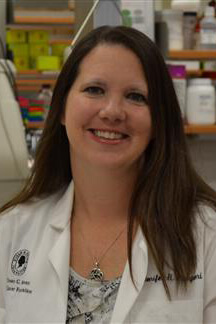
Jeni Prosperi, PhD
Associate Professor of Biochemistry, Molecular Biology & Pharmacology
- Phone
- (574) 631-4002
- Address
-
1234 N Notre Dame Ave
A134 Harper Hall
South Bend, IN 46617 - PubMed:
-

- CV:
- Download CV
Bio
- Assistant Professor, Biochemistry and Molecular Biology, Indiana University School of Medicine 2012- Present
- Adjunct Assistant Professor, Biological Sciences, University of Notre Dame 2013-Present
- Post-doctoral Fellow at University of Chicago (K. Goss Lab) 2007-2012
- Post-doctoral Fellow at University of Cincinnati (K. Goss Lab) 2007
- PhD Integrated Biomedical Science, The Ohio State University 2006
- BA Microbiology, Miami University, Oxford, Ohio 2000
Key Publications
- VanKlompenberg, M.K., Bedalov, C., Fernandez Soto, K., and Prosperi, J.R. (2015) APC selectively mediates response to chemotherapeutic agents in breast cancer. BMC Cancer, Jun 7;15:457. PMCID: PMC4458029.
- Lesko, A.C., Goss, K.H., Yang, F., Schwertner, A., Hulur, I., Onel, K., and Prosperi, J.R. (2015). The APC tumor suppressor is required for epithelial cell polarization and three-dimensional morphogenesis. BBA - Molecular Cell Research (ELS) 1853(3), 711-723.
- Lesko, A.C., Goss, K.H., and Prosperi, J.R. (2014). Exploiting APC Function as a Novel Cancer Therapy. Curr Drug Targets 15(1), 90-102.
- Odenwald, M.A.*, Prosperi, J.R.*, and Goss, K.H. (2013) Localization of the APC tumor suppressor at cell protrusions is required for breast cancer cell migration and invasion. BMC Cancer, 13:12. PMCID: PMC3556124 *These authors contributed equally to this work.
- Prosperi, J.R., and Goss, K.H. (2012) Wnt signaling in lactation. In: Lactation: Natural Processes, Physiological Responses and Role in Maternity, Nova Science Publishers. Eds: Lisa M. Reyes Cruz and Douglas C. Ortiz Gutierrez.
- Prosperi, J.R., Khramtsova, G.F., Khramtosov, A.I., and Goss, K.H. (2011) Loss of APC promotes PyMT-mediated mammary tumorigenesis. PLoS ONE, 6(12):e29339.
- Prosperi, J.R. and Goss, K.H. (2011) Wnt Pathway-independent Activities of the APC Tumor Suppressor. In: Tumor Suppressors, Ed: Susan D. Nguyen, Nova Science Publishers, pp. 105-132.
- Prosperi, J.R., Lue, H.H., and Goss. K.H. (2011) Dysregulation of the Wnt Pathway in Solid Tumors. In: Targeting the Wnt Pathway in Cancer. Eds: Kathleen Goss and Michael Kahn, Springer, New York, pp. 81-128.
- Prosperi, J.R., and Goss, K.H. (2010) A Wnt-ow of Opportunity: Targeting the Wnt/b-catenin Pathway in Breast Cancer. Curr Drug Targets, Sep;11(9):1074-88.
- Prosperi, J.R.*, Becher, K.R.*, Willson, T.A., Collins, M.H., Witte, D.P., and Goss, K.H. (2009) The APC tumor suppressor is required for epithelial integrity in the mouse mammary gland. J. Cell Phys, Aug;220(2):319-31. *These authors contributed equally to this work.
- Robertson, F.M., Mallery, S.R., Bergdall-Costell, V.K., Cheng, M, Pei, P, Prosperi, J.R., Ferrari, M. (2007) Cyclooxygenase-2 directly induces MCF-7 breast tumor cells to develop into exponentially growing, highly angiogenic and regionally invasive human ductal carcinoma xenografts. Anticancer Res. Mar-Apr; 27(2): 719-27.
- Prosperi, J.R., and Robertson, F.M. (2006) Cyclooxygenase-2 Directly Regulates Gene Expression of P450 Cyp19 Aromatase Promoter Regions pII, pI.3, and pI.7, and Estradiol Production in Human Breast Tumor Cells. Prostaglandins Other Lipid Mediat, Oct;81(1-2):55-70.
- Prosperi, J.R., Mallery, S.R, Kigerl, K.A., Erfurt, A.A., and Robertson, F.M. (2004) Invasive and Angiogenic Phenotype of MCF-7 Human Breast Tumor Cells Expressing Human Cyclooxygenase-2. Prostaglandins Other Lipid Mediat, Apr;73(3-4):249-64.
| Year | Degree | Institution |
|---|---|---|
| 2006 | PhD | The Ohio State University |
| 2000 | BA | Miami University |
My laboratory focuses on a tumor suppressor called Adenomatous Polyposis Coli (APC) in the development and progression of cancer. We are particularly interested in the function of APC that is independent of it’s role in regulation of the Wnt/β-catenin signaling pathway. We have found that down-regulation of APC results in activation of the focal adhesion kinase (FAK) pathway, Src kinase, the STAT3 transcription factor, and epithelial membrane protein 2 (EMP2). Consistent with this, there are two broad over-arching themes in my laboratory.
We are looking at the maintenance of epithelial polarity and the relationship between the APC, polarity, and tumor development. In this case, we use a variety of in vitro and in vivo model systems. We have begun to understand the through APC’s interactions with the cytoskeleton and known polarity complexes, APC itself is able to maintain apical-basal polarization. We are also interested in how the loss of polarity leads to tumor development in epithelial tissues.
We are also investigating the molecular basis by which APC loss mediates the development of breast cancer and chemoresistance. We have found that APC loss results in resistance to standard chemotherapeutic agents and that we are able to use combination therapy to alleviate that resistance. Again, we use a combination of in vitro and in vivo model systems to answer these important questions about treatment of breast cancer patients. Finally, we are beginning to perform data mining studies and investigating the mutation and methylation status of breast cancer patients with loss of APC.
See our lab webpage at: https://prosperilab.wixsite.com/prosperilab
VanKlompenberg MK; Bedalov CO; Soto KF; Prosperi JR; BMC cancer 2016 Nov 28
Lesko AC; Prosperi JR; Experimental cell research 2016 Nov 24
VanKlompenberg MK; Bedalov CO; Soto KF; Prosperi JR; BMC cancer 2015 Jun 7
Lesko AC; Goss KH; Yang FF; Schwertner A; Hulur I; Onel K; Prosperi JR; Biochimica et biophysica acta 2015 Jan 8
Xu J; Prosperi JR; Choudhury N; Olopade OI; Goss KH; PloS one 2015 Feb 6
Prosperi JR; Goss KH; Current drug targets 2014 Jan
Lesko AC; Goss KH; Prosperi JR; Current drug targets 2014 Jan
Odenwald MA; Prosperi JR; Goss KH; BMC cancer 2013 Jan 9
Prosperi JR; Khramtsov AI; Khramtsova GF; Goss KH; PloS one 2011 Dec 22